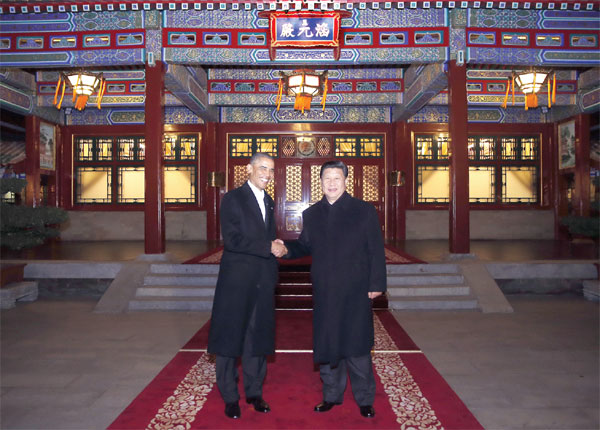Managing differences key to US-China ties
Updated: 2015-02-09 08:04
(China Daily)
|
|||||||||||
 |
|
Chinese President Xi Jinping shakes hands with US President Barack Obama at the Zhongnanhai leadership compound on Tuesday night in central Beijing after the APEC meeting. [Photo/Xinhua] |
The invitation the US government has extended to President Xi Jinping for a state visit, and the similar invitations extended to major Asian countries, which were announced by US National Security Adviser Susan Rice on Friday, has been viewed by some as a signal of United States deepening its "pivot to Asia."
Although the details of President Xi's visit are yet to be announced, a meeting between the leaders of the biggest developed country and the biggest developing country always catches the attention of many, not just in the two countries concerned, but also in the rest of the world.
This is because how the bilateral relations between the two countries develop is not just in the interests of both, it is also in the interests of world peace and development, and because US-China relations have long been characterized by differences on some major issues, which have disrupted the smooth development of ties over the past several decades.
On the question of the US' arms sales to Taiwan, on the question of the Dalai Lama, (who attended a National Prayer Breakfast last week, along with US President Barack Obama, who delivered a speech), on China's disputes with some countries in the South China sea over territorial waters, China and the US have different stands.
However, these differences, even though some of them concern the core interests of China or the US, should never stand in the way of improving bilateral relations, which, to a large extent, transcend the interests of both countries alone, given the responsibility both countries share to maintain world peace and development.
The US' "pivot to Asia" has intensified some of its differences with China, although the latter has reiterated on different occasions that it welcomes the US' presence in Asia, so long as it is not meant to cause trouble for the integration of Asia or for China's peaceful development of its amiable relations with its neighbors.
To a large degree, how to manage differences is always a topic high on the agenda of any meeting between the leaders of China and the US, as their relations cannot develop without interruptions should both not be aware of where to toe the line so as not to infringe upon each other's core interests.
The atmosphere of a relaxed stroll Xi Jinping and his US counterpart enjoyed in the Zhongnanhai Compound in Beijing in September last year is what we expect will help this visit to further China-US ties.
Related Stories
China, US vow to deepen military relations 2015-01-29 16:29
'Rich agenda' for China, US cooperation: official 2015-02-05 12:00
China-US ties entering a more delicate period 2015-01-26 08:03
China, US should make new gains 2015-01-07 07:45
Today's Top News
Germany, China to further promote cooperation
Norway's expulsion of Chinese academic old trick to defame China
Poroshenko meets Hollande, Merkel over Ukraine crisis
Lenovo has makings of a global brand
Prince William to visit China
Chinese FM eyes 'harvest' for ties with Slovakia
Russia leads UN initiative to target IS
New Greek govt lobbies across Europe for solution to its debt
Hot Topics
Lunar probe , China growth forecasts, Emission rules get tougher, China seen through 'colored lens', International board,
Editor's Picks

|

|

|

|

|

|





